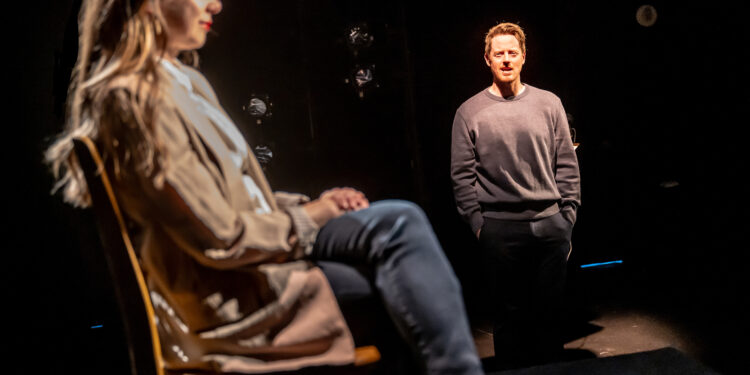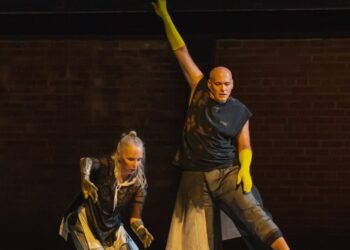Now on stage in the Michael Young Theatre in the Young Centre for the Performing Arts, 50 Tank House Lane, Toronto’s Distillery District
“Playwright Hannah Moscovitch’s ‘Red Like Fruit’ offers a compelling reason to go to the theatre. Led by two masterclass actors, the performance unfolds as an edge-of-your-seat, tautly woven thriller of psychological suspense in this post-# #MeToo era that still hasn’t learned its lesson. Enthralling, but be warned, the material is often graphically explicit.”
Hannah Moscovitch’s ‘Red Like Fruit’ might even become a prime example of a contemporary memory play for twenty-first-century audiences.
In her Playwright’s Programme Note, she writes about how she likes to explore the world lovingly, yet with a knife. In ‘Fruit,’ what she’s studying with the knife is herself and what comes out after the deep cut.
Reporter Lauren (Michelle Monteith) covers a high-profile case of domestic violence. As she begins digging further into these horrific events, she begins re-visiting moments from her past involving men who have sexually assaulted her. Lauren believes she thought she had some understanding of why the events happened to her in the past. Further digging into the high-profile case becomes troubling as Lauren makes new, startling discoveries about her past. She turns to Luke (David Patrick Flemming) to narrate the events of her life.
It’s not clear what the connection is between the two characters, but there must be something. Throughout the performance, Luke turns to Lauren to check in with her to see if she is alright. I don’t believe a stranger would check in. At one point, Luke doesn’t want to continue, but Lauren says she’s fine and that it’s okay to do so.
I couldn’t get it out of my mind why Lauren would ask a man to narrate the moments in her life when other men violated her.
That is precisely what Moscovitch wants the audience to discover.
The simplicity of the visual staging makes ‘Red Like Fruit’ even more haunting. The Michael Young stage remains swathed in pitch black. Except for a spotlit chair on a riser centre stage, and a music stand and table set stage left, designer Kaitlin Hickey effectively creates a foreboding look. What little colour on the professional-looking business attire worn by Monteith and Flemming becomes swallowed up in the pitch blackness on the stage.
Lighting is crucial to the play’s integral vision. The subtle touches Hickey chooses, by increasing and decreasing the intensity, significantly enhance the peaks and valleys of audience response that may trigger personal and emotional upheaval either within oneself or among other audience members.
As director, Christian Barry bears a great responsibility. His vision incorporates a visceral, blatant honesty in Lauren’s descent. Not only that, I get the impression Barry had to check in on Monteith and Flemming quite a bit during rehearsals to see how they were doing. I’m assuming either he or someone will continue checking in on the performers now that the show is running.
But who’s checking in on audience members? Have any been triggered by something they may have heard in Luke’s narration?
Although the theatre provides a reflection room if required, sometimes, the theatre’s job is to be in your face and visceral. Let’s not forget the art form should move audience members emotionally. The theatre can’t lay at its feet the continued responsibility of trigger warnings all the time.
David Patrick Flemming narrates with compassion. It’s not an audiobook or textbook telling. There are moments when he, too, is triggered by what he shares, and his voice conveys a strong sense of discomfort. Even when he may appear bothered by what he tells the audience, Flemming continues forward, tasked with telling the truth of the story.
It is Michelle Monteith, as Lauren, who faces the most significant challenge as a performer.
She’s spellbinding in her onstage work.
Monteith listens intently to Flemming’s narration, especially in those moments when a close family member assaults her. She responds not just with her facial expressions but with her physicality and being. There are moments where she remains motionless in the spotlit chair, almost as if Lauren accepts that any assault is part of a woman’s life. A few times, there may be a slight turn of Lauen’s head to something Luke has just narrated. When she stands, there is a clear purpose and reason behind her action. When she moves around the chair, there is a further reason why she has made this choice to move.
I’m finding it challenging not to spoil Moscovitch’s plot twists in a story that still haunts me even two days after seeing it.
What haunts me the most is the significance of the play’s title once it becomes clear.
It’s chilling to hear.
The only thing I will say…
A woman telling her own story of sexual assault should be more than enough proof of belief in the victim. Yet, our # MeToo generation says that’s not enough for women to do. If the story comes from a male, then he holds more credibility than a woman.
That’s unfair, that’s wrong.
Yet why do people listen more to a male voice sharing the same story than a female voice?
Whose voices do we empower within the context of ‘Red Like Fruit?’ Men or women?
These post-show questions are ones worth discussing.
Running time: approximately 80 minutes with no interval/intermission.
‘Red Like Fruit’ runs until June 15 in the Michael Young Theatre in the Young Centre for the Performing Arts, 50 Tank House Lane, Toronto’s Distillery District. For tickets, youngcentre.ca or call the Box Office at (416) 866-8666.
SOULPEPPER, 2b Theatre Company and Luminato Festival present the Toronto premiere
‘Red Like Fruit’ by Hannah Moscovitch
Directed by Christian Barry
Set, Lighting and Costume Designer: Kaitlyn Hickey
Associate Lighting Designer/Tech Manager: Alison Crosby
Stage Manager: Arwen MacDonell
Performers: Michelle Monteith as Lauren. David Patrick Flemming as Luke
















